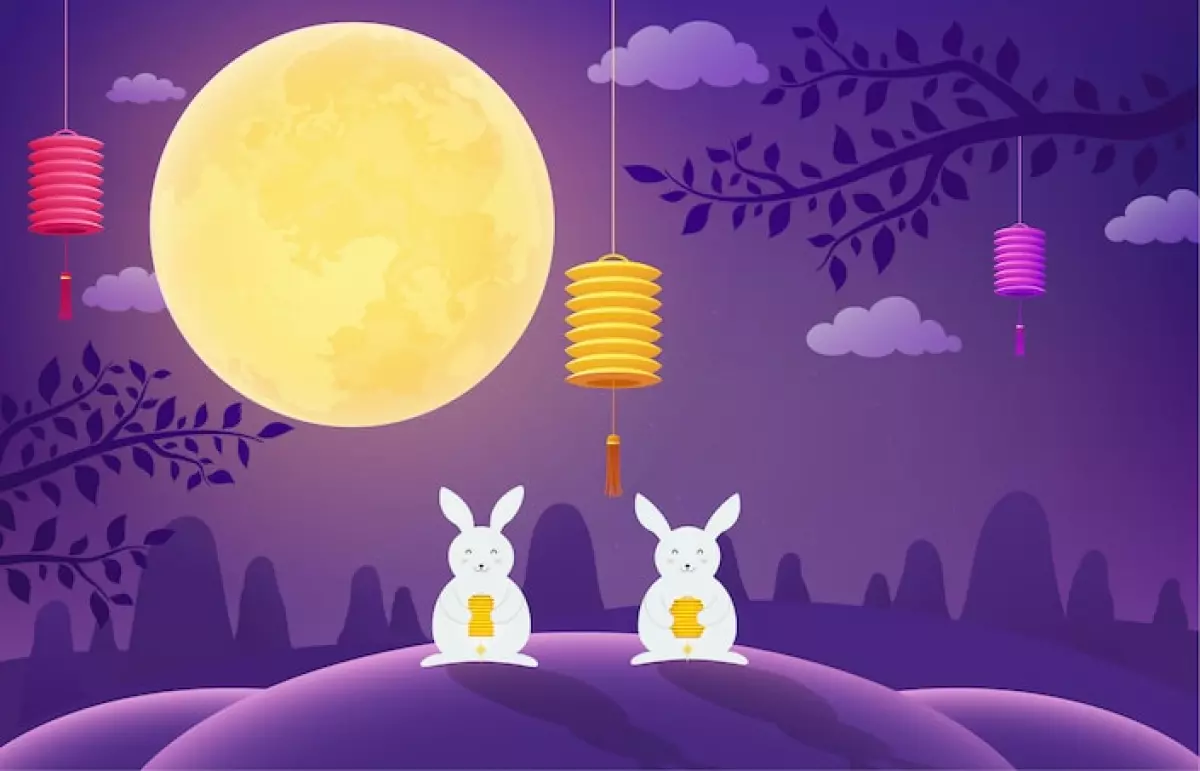 Image: Two white rabbits on a purple background depicting a night scene with a full moon.
Image: Two white rabbits on a purple background depicting a night scene with a full moon.
What is the Chinese zodiac?
Intrigued by the 12-year Chinese zodiac cycle? Wondering what significance the Year of the Rabbit holds? Let's dive into this essential zodiac sign, which embodies elegance, peace, and a hint of luck.
Brief introduction to the Chinese zodiac
Have you ever heard of "shēngxiào"? In Chinese, it refers to the 12 zodiac animals. These animals include the Rat, Ox, Tiger, Rabbit, Dragon, Snake, Horse, Goat, Monkey, Rooster, Dog, and Pig. The order of appearance holds significance in Chinese culture.
The origins of the Chinese zodiac calendar are debated. Some believe it stems from the Great Race, where animals competed against each other. Others associate each animal's position in the cycle with its most active time of the day. Regardless, it plays a significant role in shaping traditions, holidays, and cuisine in Asian communities worldwide.
Rabbit years
In the Chinese zodiac, the Year of the Rabbit (兔年 tùnián) occurs once every 12 years. In the last century, Rabbit Years fell in 1927, 1939, 1951, 1963, 1975, 1987, and 1999. The most recent Year of the Rabbit was in 2011, with the next one coming up in 2023. People born in any of these years are associated with the Rabbit sign (兔子 tùzǐ).
The rabbit in Chinese culture
The Chinese zodiac animals symbolize a deep connection with China's ancient heritage. Rabbits, like all the zodiac animals, have a unique position in Chinese history, mythology, and customs.
The legend of the Jade Rabbit
When Westerners gaze at the moon, they see cheese or the Man in the Moon. But for Chinese culture, the moon reveals the Jade Rabbit (玉兔 Yùtù). Legend has it that the Jade Emperor disguised himself as a beggar to find a worthy animal to assist him in preparing the elixir of life. The Rabbit selflessly offered itself as food, leading to its eventual apotheosis as the Jade Rabbit.
The Mid-Autumn Festival
中秋节 (Zhōngqiūjié) or the Mid-Autumn Festival holds great significance in Chinese culture. This ancient festival, lasting three days, occurs on the 13th to 15th day of the eighth lunar month. The moon is at its brightest and fullest during this period, coinciding with the harvest season.
Rabbits are associated with the festival through legends of the Moon Palace. The Moon Goddess Chang'e allows the Jade Rabbit to keep her company in the Moon Palace, where it quietly creates the elixir of life. Images of rabbits are common during the Mid-Autumn Festival, symbolizing sobriety and humor.
Lucky rabbits
In Chinese culture, rabbits are believed to bring luck. In the myth of the Great Race, the rabbit's nimble jump across a wide river, aided by a floating log, secured its place in the zodiac. Superstitions surround rabbits, with buns shaped like rabbits being popular at weddings in northwestern China. However, some superstitions associate rabbits with negative outcomes, such as the fear that pregnant women eating rabbit meat will result in babies being born with harelips.
Let's hop to it
Now that we've explored the significance of rabbits in Chinese culture, let's uncover what it means to be born in the Year of the Rabbit. In Chinese belief, the zodiac year of one's birth can influence personality, love life, and career, among other aspects.
Rabbit personality traits
Those born in the Year of the Rabbit are often seen as free-spirited individuals constantly pursuing their ideas. However, their weak wills make it challenging for them to achieve greatness. They tend to be sensitive and delicate when it comes to managing personal matters, sometimes leading to jealousy and struggles when faced with obstacles. Despite their reservations, rabbits are excellent listeners, negotiators, and team players.
Romantic rabbits: Compatibility
Chinese zodiac signs play a significant role in romantic relationships. For rabbits, the best matches are with individuals born in the Year of the Dog, Sheep, or Pig. These signs share a compassionate and easy-going nature that makes them compatible with rabbits. Rabbits and Sheep create ideal matches due to their amiable and romantic personalities. Rabbits and Dogs support each other's needs, while rabbits and Pigs arouse each other's interests and sympathies.
Suitable career paths
With their artistic and observant nature, individuals born in the Year of the Rabbit excel in literature, art, and music. Delicacy and keen observation make them suitable for careers such as business consulting, engineering, and translation. Additionally, writing, nursing, and food quality inspection align with their strengths. However, they are not ideally suited for manual labor, time-sensitive jobs, or fiercely competitive environments.
Naming babies born in the Year of the Rabbit
Selecting an auspicious name is crucial in Chinese culture. When naming someone born in the Year of the Rabbit, certain characters can bring good luck. Radicals such as "cǎo" (grass), "shān" (hair), and "kǒu" (mouth) hold symbolic meanings related to rabbits' traits, happiness, wealth, confidence, and ambitious goals.
Celebrate the Year of the Rabbit in Guilin!
The Chinese zodiac is just one captivating aspect of Chinese culture. To truly discover China, immerse yourself in the language. Join CLI's expert teachers in Guilin for personalized Chinese classes that not only teach you the language but also provide valuable insights into the nuances of Chinese culture.
Year of the Rabbit vocabulary
生肖 (shēngxiào) - Chinese zodiac sign 兔年 (tùnián) - Year of the Rabbit 部首 (bùshǒu) - radical 艹 (cǎo) - grass radical 彡 (shān) - hair radical 口 (kǒu) - mouth radical 月亮 (yuèliang) - moon 玉兔 (Yùtù) - Jade Rabbit 中秋节 (Zhōngqiūjié) - Mid-Autumn Festival 月宫 (yuègōng) - Moon Palace

















